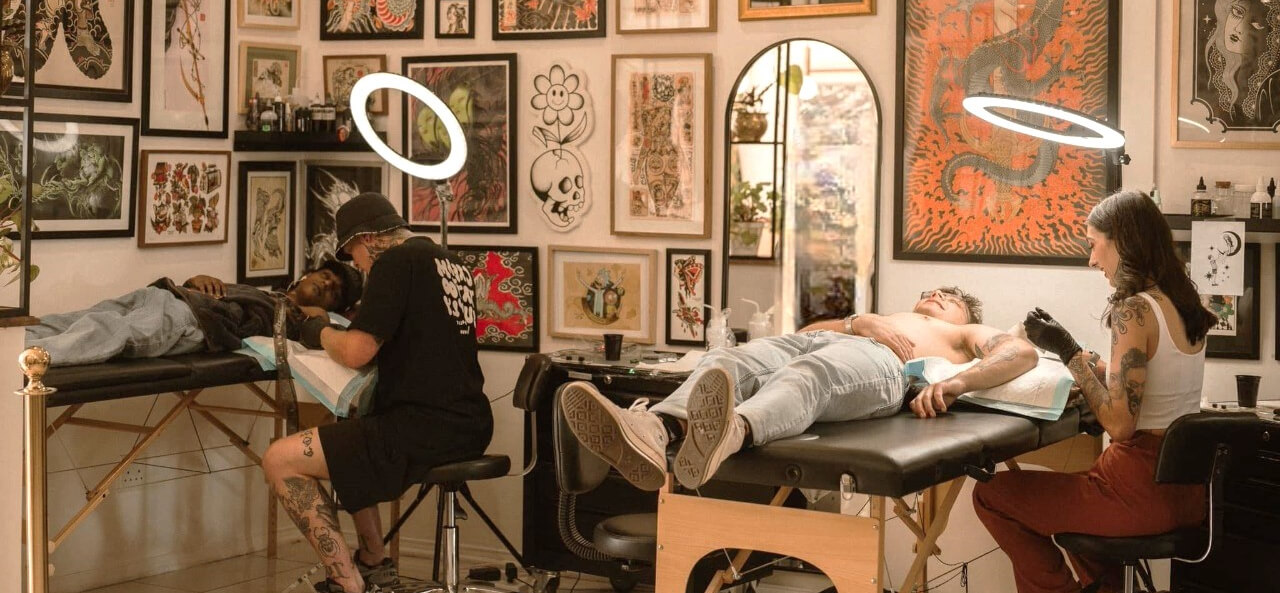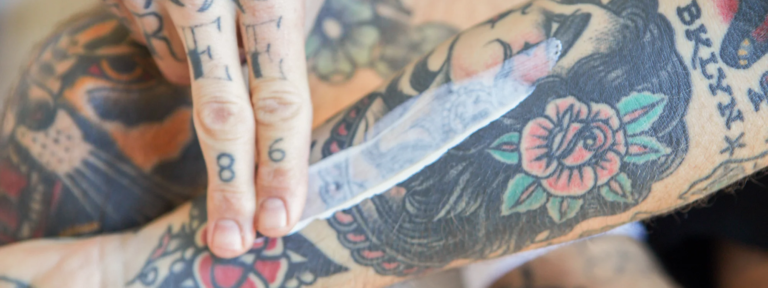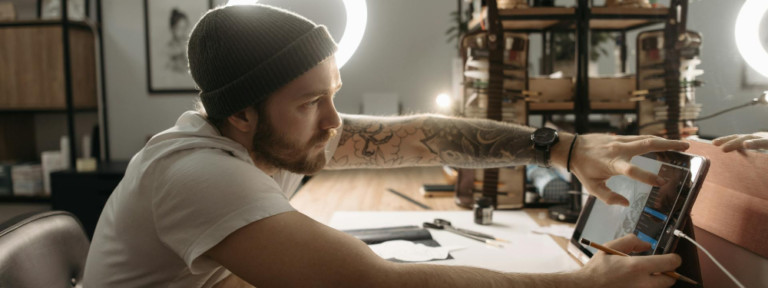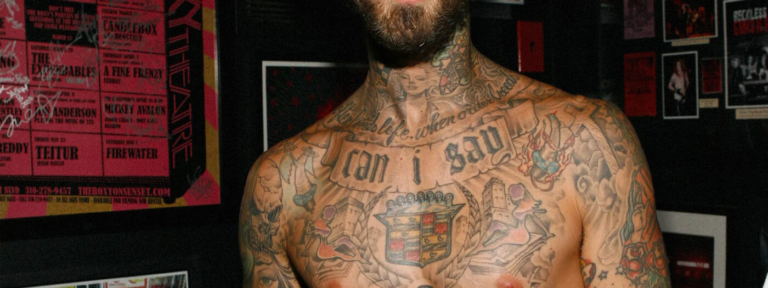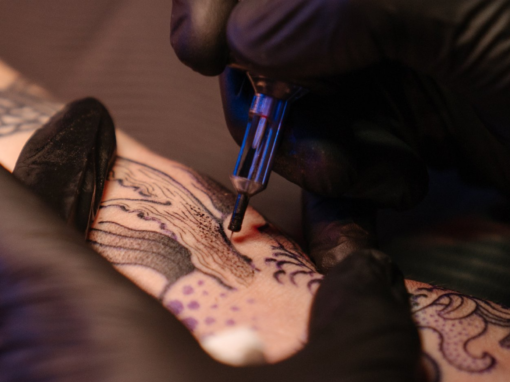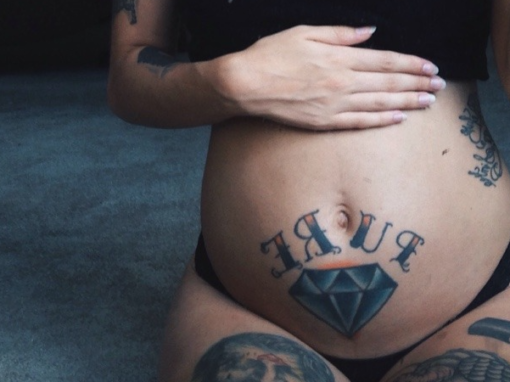Over the years, the art of tattooing has expanded beyond its niche and has become a popular industry that has become widespread. More and more people are becoming interested in the field.[1] So here we are going to share with you all the information needed on how to open a tattoo studio.
In this guide, we discuss current trends, profitability of the tattoo business, legal aspects, setting up and equipping a studio, hiring artists, successful marketing and branding strategies, customer service, and a look at potential problems you may encounter. Whether you are an experienced tattoo artist looking to open your studio or an entrepreneur starting in this creative field, this comprehensive guide will help you navigate the many aspects of the tattoo business.
An Overview of the Tattoo Industry and Its Potential
Tattooing, once a niche art form, has grown into a booming industry. In recent years, the demand for tattoos has surged, and it’s not just about getting inked anymore; it’s a business with lots of potential.[2] People from all walks of life, young and old, are embracing tattoos, and this overview will shed light on what’s happening.
Current Trends in Tattooing
If you are wondering how to start an art business in this area, you need to keep up with current trends. There are several reasons for this:
- First, staying on top of emerging trends means knowing what resonates with today’s consumers. This will make the studio more relevant and appealing to the target market.
- Second, recognizing and implementing popular trends allows the studio to stand out in a competitive market, and attract a niche clientele by offering such sought-after options (for example, natural and vegan tattoo products or meeting the demand for spiritual body modifications).
- Following current tattoo trends gives aspiring tattoo shop owners the foresight and adaptability necessary to succeed in a dynamic and competitive industry. It’s not just about following fashion, it’s about understanding the direction of the market and strategically positioning the studio for long-term success.
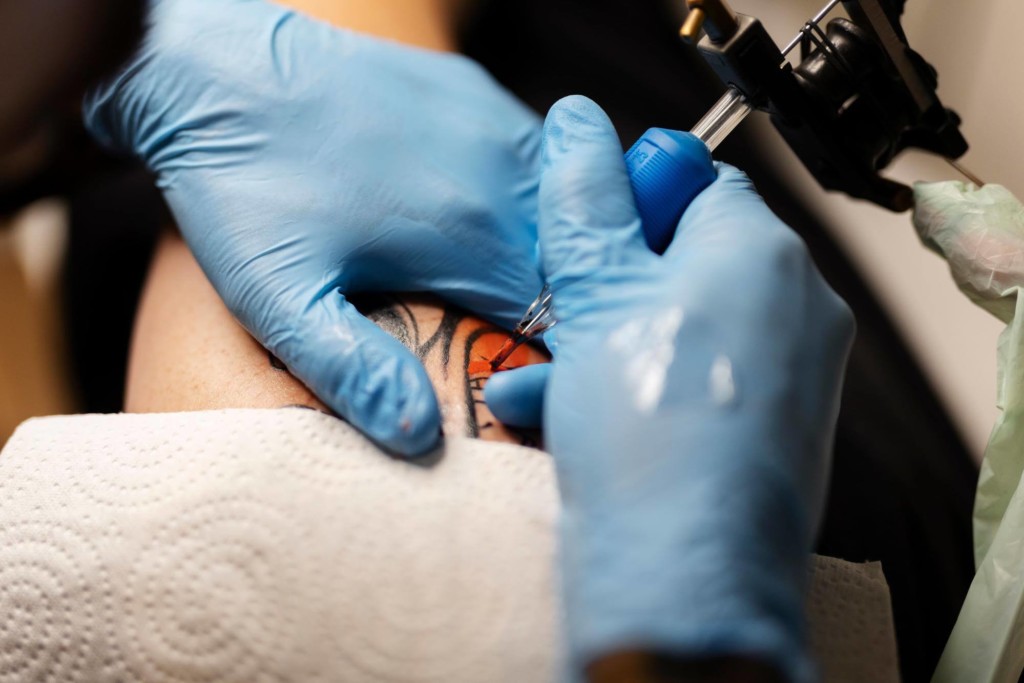
Now let’s talk about the trends. One notable trend is the growing demand for natural and vegan tattoo products, such as vegan ink, driven by consumer concerns about the harmful effects of chemical-based inksThe concern about the harmful effects of certain ingredients, such as heavy metals like lead, mercury, and cadmium, in traditional tattoo inks is not entirely a myth, prompting increased attention to potential risks in the tattoo industry..
Speaking about styles and designs in tattooing, these are the most popular nowadays:
- ?️ spiritual body modifications, including mandalas and religious symbols like the crucifix, are emerging as key industry trends;
- ? tattoo enthusiasts often embrace nature-inspired motifs, including floral designs, animals, and landscapes;
- ✫ minimalist and fine-line tattoos;
- ? watercolor-style tattoos;
- ✨ many opt for custom tattoos, collaborating closely with tattoo artists to create unique and personalized designs.
Profit in the Tattoo Business
Making money in the tattoo business is possible, but not easy. It is very important to control your expenses and plan for them. Expenses for rent, equipment, and supplies can increase quickly, so budgeting is crucial. If you can balance your expenses and income, you will be able to make a profit.
Tattoo artists usually charge either by the hour or per tattoo. The price depends on the skill level, the complexity of the drawing, and the location. Remember that building a loyal customer base can lead to repeat business and word-of-mouth referrals, which will increase your profits.
In a nutshell, to make a profit in the tattoo business, you need to develop your skills (or have artists with high skills), choose the right location, balance quality and price, promote your services, comply with regulations, manage costs, and consider scaling your offerings. With the right approach, you can turn your passion for tattooing into a successful and profitable business.
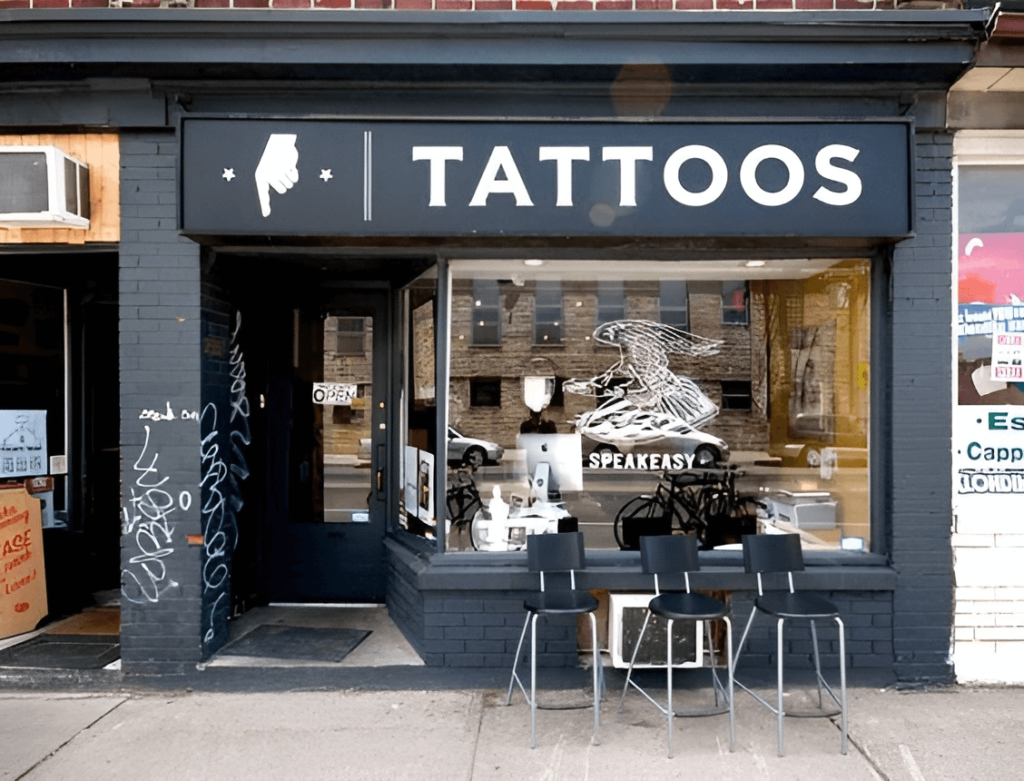
Does Market Research and Planning Matter?
Of course, market research and planning are the foundation of a successful tattoo business. Foremost, you need to understand your target audience, local competitors, and industry trends. Market research allows you to identify gaps in the market, assess the demand for certain styles, and adapt your services to the preferences of potential clients.
In addition, a well-thought-out business plan is a roadmap to success. It helps to set clear goals, effectively allocate resources, and anticipate possible problems. Thus, in the tattoo business, doing market research and creating a plan isn’t just useful — it’s essential for long-term success.
What are the Legal and Licensing Requirements?
This is another important topic to take care of. When setting up a tattoo business, you need to navigate the legal and licensing situation. To have a certified tattoo studio, it is necessary to ensure compliance with regulatory requirements.
- For a tattoo studio
To open a tattoo studio, you need to obtain several permits and certificates:
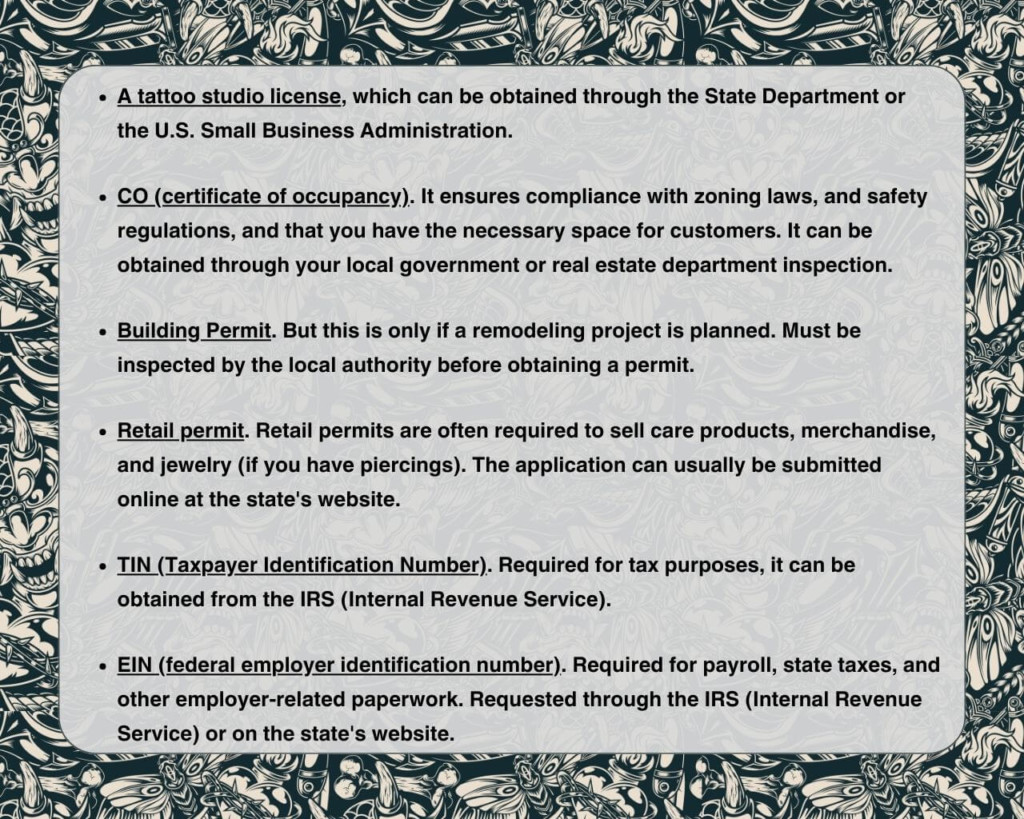
General list of required permits and certificates for a tattoo studio
- For tattoo artists
As for professional licenses and certifications for tattoo artists, here are the main ones:
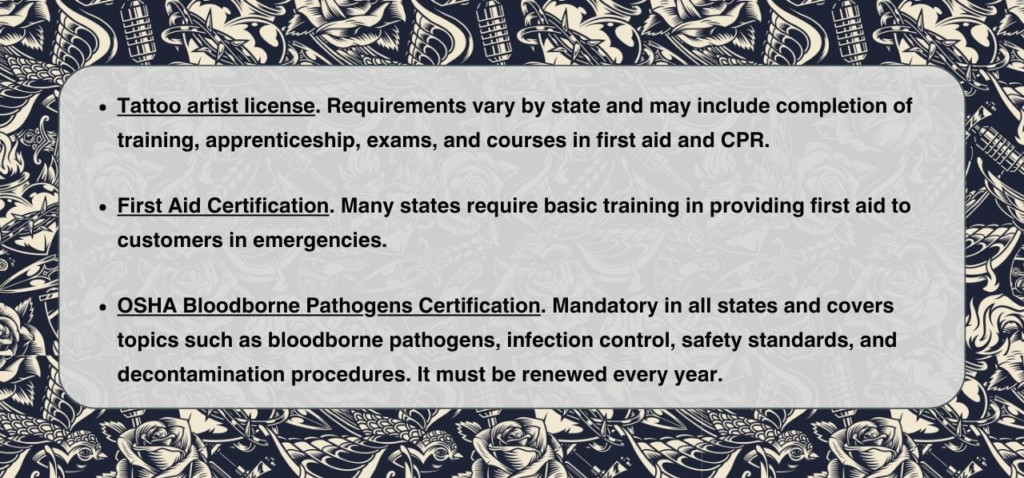
General list of professional licenses and certifications for tattoo artists
How to Set Up and Equip a Tattoo Studio
Once you have made sure that the studio is certified and complies with hygiene standards, you can move on to organizing a tattoo shop. It requires careful planning and the necessary equipment to create a favorable and professional environment for both artists and clients.
Designing a Tattoo Studio Space
In this part, we highlight the five main points in studio design you should pay attention to, listed below.
- ? Space Planning
Start with the layout of the tattoo studio, what and where it will be located. Allocate separate areas for tattooing, sterilization of equipment, and disposal of used material, as well as an area for client consultations and reception.
- ✨ Aesthetic appeal
Consider the overall aesthetics of the space. Choose a theme or design that reflects the style and personality of your studio.
- ? Comfortable equipment
Make sure the tattoo artist and the client are comfortable sitting and working. You don’t have to buy the best professional tattoo machines or super expensive tattoo beds, but still try to invest in quality and comfortable equipment.
- ? Lighting
Sufficient and directional lighting is essential. Install bright natural light to illuminate the tattoo area. Also, consider adjusting the lighting for different situations (for example, for photos, or when working on small tattoo elements).
- ? Private spaces
If possible, create private areas for consultation and discussion. Privacy is essential for both artists and clients.
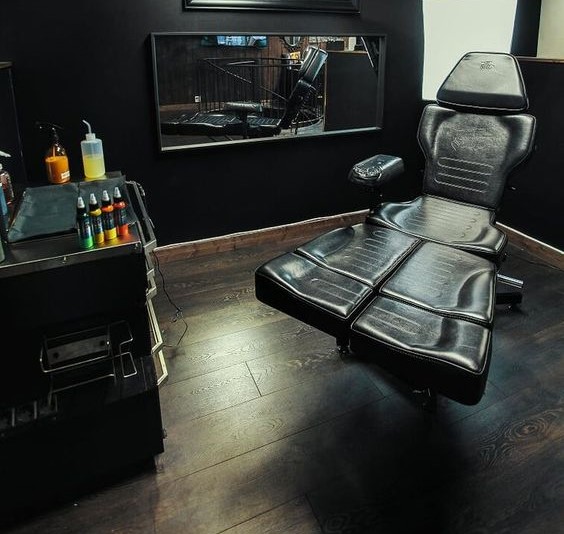
Essential Equipment
Setting up a well-equipped tattoo studio requires the necessary tools and supplies. Here is a basic list of them (which you can consider a tattoo starter kit):
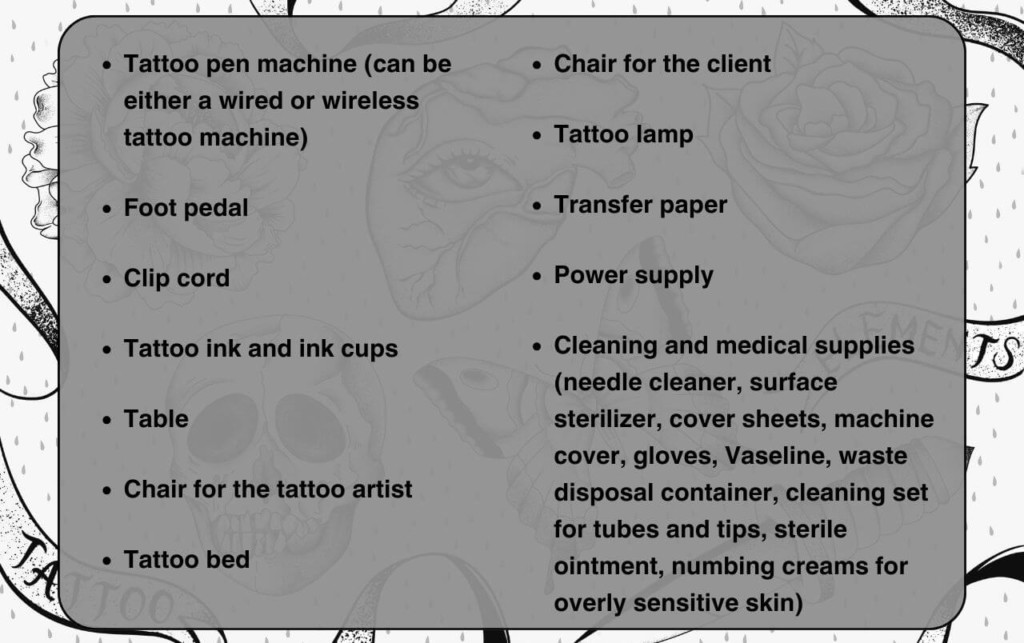
The basic list of necessary equipment in a tattoo studio
The heart of the operation is the tattoo machine, the most important tool for any tattoo artist. When searching for the best tattoo machines, professionals often opt for high-end options that provide precision and quality work.
The versatility of a tattoo machine (or it can be a tattoo penA tattoo machine employs electromagnetic coils and an armature bar to drive the needle, while a tattoo pen, resembling a pen-shaped device, uses a rotary or motor mechanism to move the needle, offering a more compact and modern alternative to the traditional machine.) and the efficiency of a wireless tattoo machine contribute to smooth operation in the studio. Therefore, you need to have both options and know how to handle them.
Comfort is paramount not only for artists but also for clients, so choosing the right tattoo chairs for clients plays a crucial role in ensuring a positive experience.
For those looking to create a studio known for excellence, investing in the best professional tattoo machines, including professional wireless tattoo machines, is a strategic choice that reflects a commitment to quality and innovation.
How to Hire Artists and Build a Team
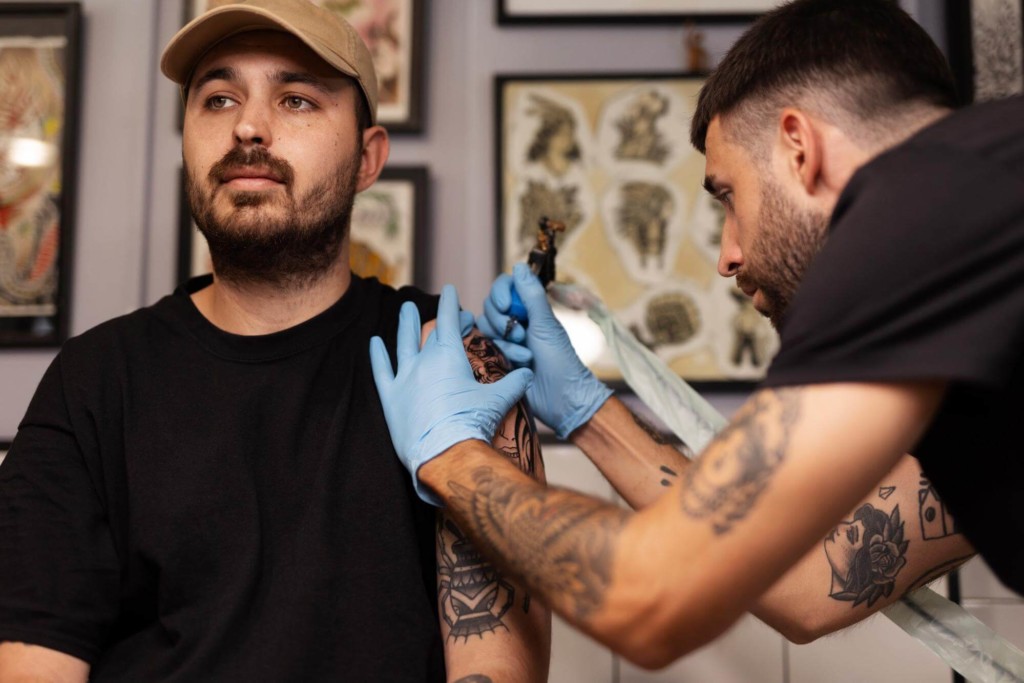
You will need a team at your tattoo studio (unless you’re a lone wolf who prefers to do everything yourself). Look for qualified professionals who match the aesthetics and values of your studio. When hiring tattoo artists, you can use the all-famous Instagram platform to search for them and their works. Analyze their portfolios, and conduct interviews and trial sessions to assess their technical skill and artistic taste.
Another option would be your former colleagues or acquaintances whom you have confidence in and would like to have join you. In this case, you may already be familiar with their style and quality of work, which will make the search easier.
You can also open a tattoo school at the salon, where you will teach how to start tattooing, how to work with clients, and other important aspects of the profession. Graduates of this school can become your employees.
You should be the driving force behind creating a favorable working environment that fosters creativity and productive teamwork in the studio. Creating a united team not only increases the quality of art produced, but also contributes to a prosperous and harmonious atmosphere in the studio.
Successful Marketing and Branding
Creating a unique brand is essential to stand out in the competitive tattoo shop environment. It’s not just about putting ink on the skin; it’s about creating an experience that will resonate with customers and give them tattoos they will love. Each element of the studio contributes to the overall image of the tattoo business. With the right marketing, from a strong online presence to creative business cards, you can build a tattoo brand that will leave an indelible mark on both customers and the wider industry.
The following are the basic steps for success in marketing and branding a tattoo studio:
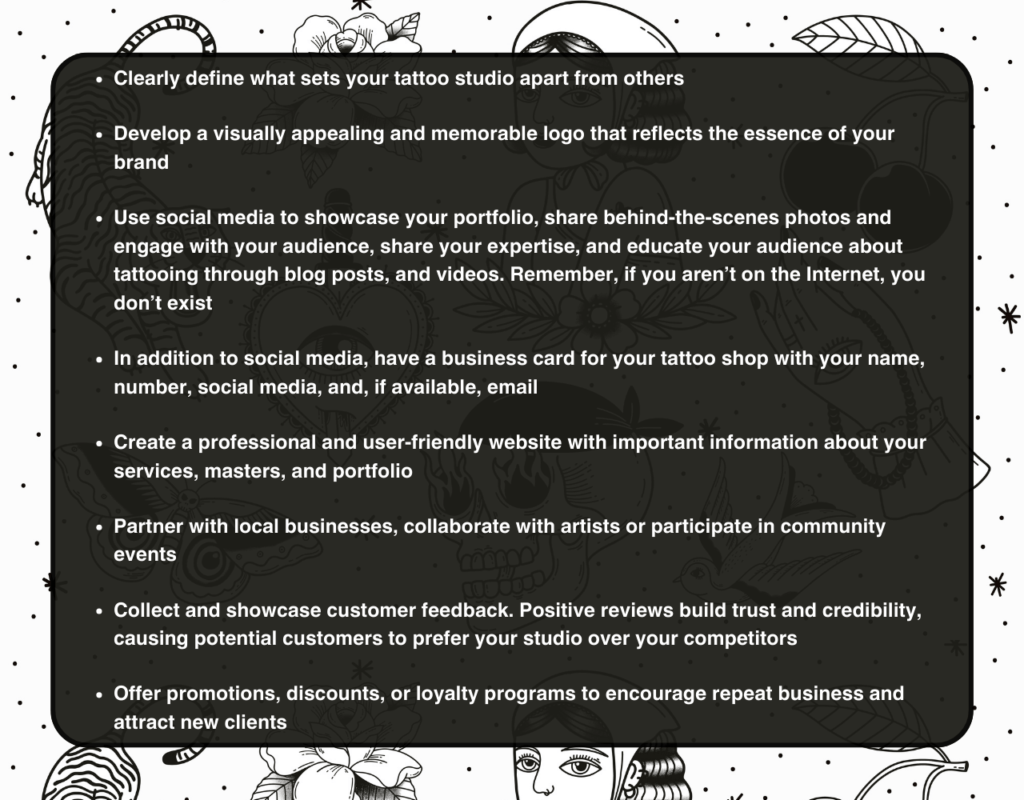
The basic steps in marketing and branding a tattoo studio
Customer Care and Building Clientele
Customer care is at the heart of building a strong clientele in the tattoo business. Using these key points, you can create a favorable atmosphere and increase customer loyalty.
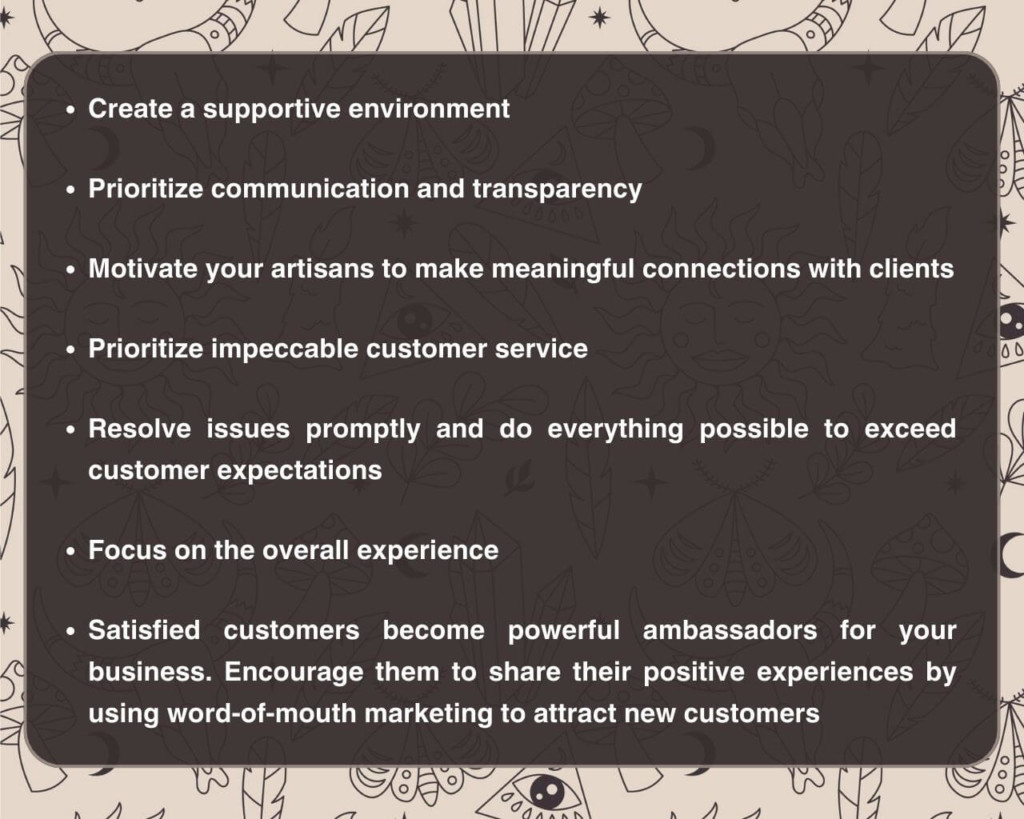
General steps for building a clientele and caring for customers
Challenges You May Face and Their Solutions
Opening a tattoo studio and operating it comes with its own set of challenges. These include managing finances, complying with local regulations, and dealing with unforeseen problems. Let’s take a closer look at them.
- Challenges
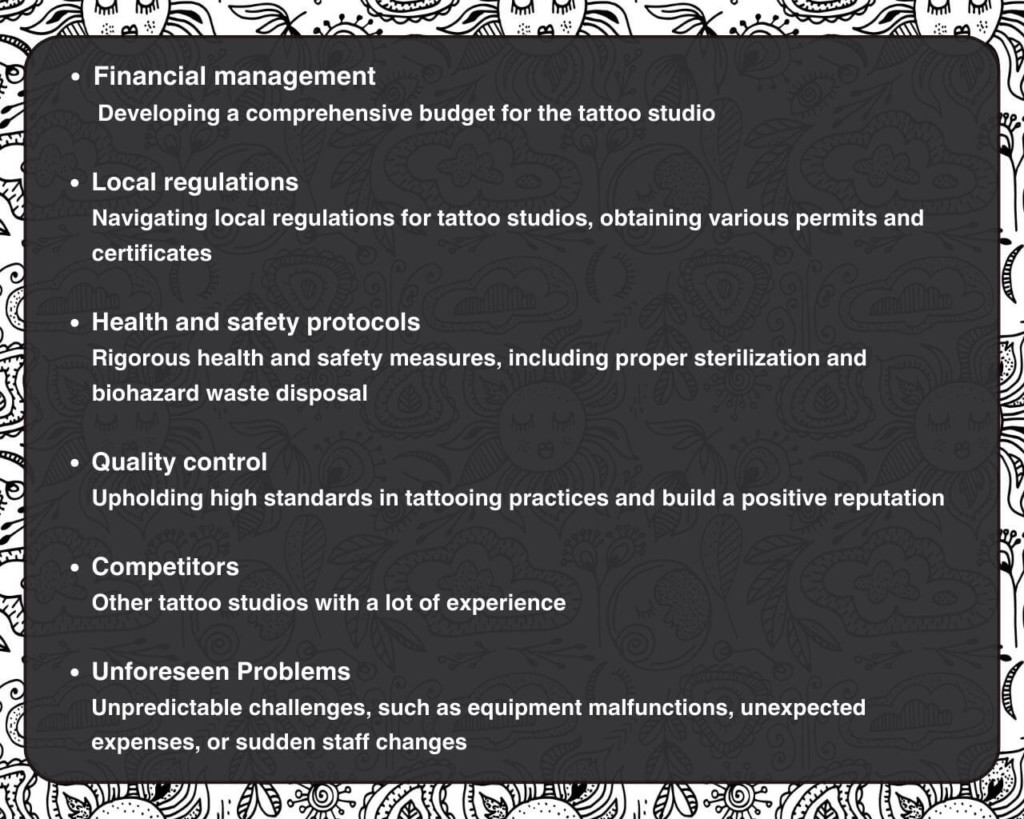
Main challenges in opening a tattoo studio
- Their solutions
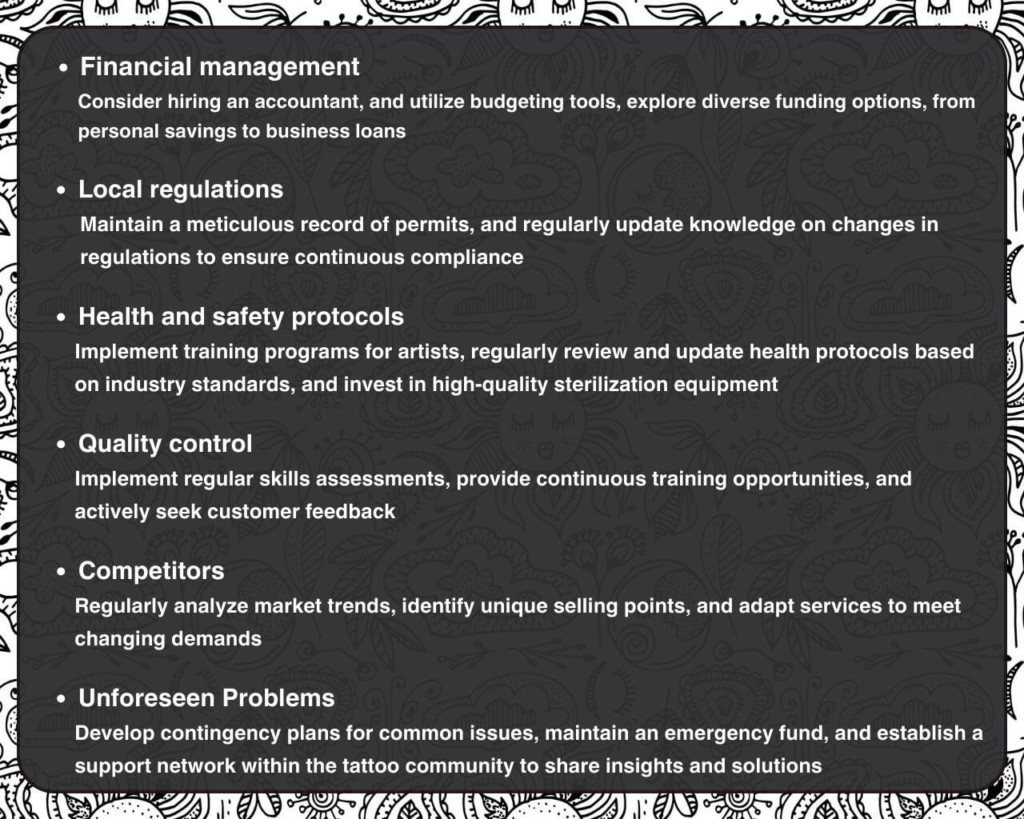
Solutions to challenges in opening a tattoo studio
How Much Does It Cost to Open a Tattoo Studio?
The cost of opening a studio can vary widely depending on factors such as location, size, and equipment. Consider expenses such as licensing and permits, studio space rental or purchase, tattoo machines, furniture, and marketing materials. Factor in additional costs for employee salaries, utilities, and ongoing supplies.
Using the tables below, you can create an estimated business plan and calculate how much you need to spend to open an American tattoo studio.
The main factors you need to consider
| Location and size of the studio | Costs are influenced by prime locations and larger spaces |
| Quality of equipment and supplies | High-quality materials increase service costs |
| Experience and skill of tattoo artists | Expertise and reputation affect pricing |
| Type and amount of advertising | Marketing expenses impact service costs |
Initial costs
| Rent or purchase payments | $2000-$5000 (per month, rent) |
| Equipment | Basic setup costs — $15,000-$20,000High-end setups may exceed $50,000 |
| Permits and licenses | $500-$4000 |
| Insurance and legal fees | Liability insurance costs $1000-$5000 (per year)Legal fees range from $1000-$3000 |
Tattoo studio operating costs (per month)
| Utilities and maintenance | $500-$1000 |
| Payroll for employees | Consider wages, taxes, and benefits, with an average hourly wage of $30 for newbies, $50 for experts |
| Supplies and equipment | $1500-$3000 |
| Advertising expenses | $500-$1000 |
| Total estimated costs | $20,500-$40,000 (estimation without calculating employee salaries and high-end equipment) |
Summary
This article contains information for both experienced tattoo artists looking to go into business and entrepreneurs looking to enter the dynamic world of tattooing. Now you know about current trends and why you need to be aware of them, the importance of market research, careful planning, and compliance with legal and licensing requirements. You’ve also learned about the equipment needed and the approximate costs of a tattoo studio.
Ultimately, with the help of this guide, aspiring tattoo business owners will be able to turn their artistic endeavors into profitable and fruitful enterprises.
FAQ
? How Do I Start a Tattoo Studio?
To open a tattoo studio, you need to follow several steps. Start by conducting thorough market research to understand your area’s demand, competition, and trends. Develop a detailed business plan, obtain the necessary licenses and permits, create cozy and aesthetically pleasing premises, and invest in high-quality equipment. Build a talented team of tattoo artists and develop an effective marketing strategy.
? Can I Open a Tattoo Studio If I’m Not a Tattoo Artist?
Yes, you can. However, it is important to be well-versed in the field, including the artistic and technical aspects of tattooing. Consider hiring experienced and skilled tattoo artists to ensure the quality of work in your salon. Your role will be to manage the business, handle administrative tasks and marketing, and create a supportive environment for your artists.
? What License Do I Need to Open a Tattoo Studio?
Medical permits, business licenses, and zoning permits are generally required. It’s worth remembering that the licenses required to open a tattoo shop vary by state, so it’s important to check with your local health department and business regulators.
? What Is the Average Cost of Opening a Tattoo Studio, Including Licenses and Permits?
Various factors affect the cost of opening a tattoo studio. Taking them into account, the total estimated cost of opening a licensed tattoo studio usually ranges from $20,000 to $80,000 or more.
?️ How Do I Market My Tattoo Business?
Start by creating a strong brand identity that reflects your studio’s unique style and values. Utilize social media to showcase the work of your artists, engage with the community, and build your online presence. You can also partner with local businesses and attend community events to increase recognition.
References
- Tattoo Market Size, Growth, Forecast | Industry Trends [2030]. (n.d.). https://www.fortunebusinessinsights.com/tattoo-market-104434
- Roeloffs, M. W. (2023, August 15). Tattoo USA: One-Third Of Americans Have Ink As Industry Projected To Hit $4 Billion. Forbes. https://www.forbes.com/sites/maryroeloffs/2023/08/15/tattoo-usa-one-third-of-americans-have-ink-as-industry-projected-to-hit-4-billion/?sh=1b57482021e0
